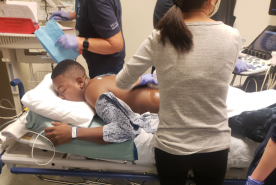Thin basement membrane disease (TBMD) is an inherited disorder that mainly affects the glomeruli, which are tiny tufts of capillaries (small blood vessels) in the kidneys that filter wastes from the blood. It is a rare disorder that has been diagnosed in less than 1 percent of the population.
The main symptom of TBMD is blood in the urine (hematuria). Another common symptom is protein in the urine (proteinuria). In most cases, there are no other major symptoms that are observed, but people with TBMD can also have high blood pressure, less urine production and body swelling.
How is Thin Basement Membrane Disease Diagnosed?
A doctor can test your blood and urine to check if your kidneys are working properly. A urine test can check for the amount of protein, blood and other things to indicate kidney damage. A blood test for serum creatinine can be used to calculate glomerular filtration rate (GFR), which tells how well your kidneys are filtering wastes from the blood.
A biopsy is usually done to confirm a diagnosis. This disorder produces unique changes in the walls of the blood vessels of the glomeruli that can be detected by electron microscopy of kidney biopsy material.
How is Thin Basement Membrane Disease Treated?
In most cases, TBMD has a benign course, meaning that the long-term prognosis for most people are good and people with the disease generally live normal lives. However, in some cases complications arise and further treatment is required.
Currently there is no specific treatment for TBMD. Similar treatments that are used in people with high blood pressure and other symptoms of chronic kidney disease (CKD) are used in people with this disease. For example, your doctor may prescribe certain medicines that are used to lower blood pressure, but may also help reduce the protein in the urine. To help with any swelling, your doctor may also prescribe diuretics (water pills). Reducing dietary salt can also help control swelling.
Although rare, dialysis or kidney transplant may be needed if the disease leads to kidney failure.
How is Thin Basement Membrane Disease Inherited?
This disorder is passed from parent to child by autosomal dominant inheritance. In other words, only one copy of the abnormal gene from one of the parents is needed to cause the disease. If one parent has TBMD, then each child has a 50% chance of getting the disease.
Changes in certain genes (known as mutations) that affect type IV collagen (a protein that is important to the normal structure and function of glomeruli) have been identified in patients with TBMD. The identified genes are called COL4A3 and COL4A4. However, such mutations are not present in all families. TBMD is similar to Alport Syndrome, which is a disease that also involves mutations in type IV collagen genes. Both are inherited disorders that mainly affect the glomeruli. Alport syndrome is generally a more serious version of TBMD, and further observation and testing may be done by your doctor to determine which disease you have.

















